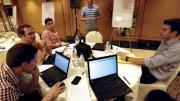The new FIELD course (Field Immersion Experiences in Leadership Development) at Harvard Business School (HBS) is designed for first-year M.B.A. students, but the faculty members in charge say they, too, are learning as they go. The course is earning plaudits from students; instructors and administrators have already heard that students have applied to HBS specifically because they find FIELD appealing, and course head Frances Frei, UPS Foundation professor of service management, promises, “It will be magnificently better next year, and magnificently better the year after that,” as those designing the program respond to feedback.
In FIELD’s first (fall semester) module, students learn about their own leadership styles through exercises with classmates, receiving the kind of candid criticism that leads to growth. In the spring, the class’s 900 members are split into six-person groups, given $3,000 per group, and challenged to take a business from concept to fruition by semester’s end.
All three modules teach skills that are hard to learn in the classroom, but the module that’s gotten the most attention is the January “global immersion,” in which nearly every member of the class was sent abroad for a week and assigned to a “global partner” business with a problem to solve. (A small contingent, unable to travel for family, medical, or other reasons, stayed in Boston and tackled similar problems for companies here.)
As noted in “Into India,” on Harvard’s varied, and deepening, connections in India, the international experience is intended to show students, rather than just tell them, that doing business in an unfamiliar location and culture is different in all sorts of unexpected ways. Students were placed in one of 10 countries—Costa Rica, Brazil, Argentina, Ghana, South Africa, Turkey, Poland, Vietnam, China, and India—for an experience that was physical and emotional, as well as intellectual, notes Youngme Moon, David professor of business administration, senior associate dean, and chair of the M.B.A. program.
Contemplating how to position a new line of hair-care products for the Indian market is one thing in the comfort of a Boston classroom. It is quite another when dealing with jetlag or the aftermath of traveling for hours over potholed roads in a car built for much shorter people.
The group charged with the hair-products project struggled with cultural factors they found surprising. Customers they interviewed didn’t voice a desire to look different, to have a hairstyle that would distinguish them from others; instead, women seemed to want to conform to an ideal of long, thick, jet-black hair. Would it be better to create a product that promised to bring hair closer to this ideal, students wondered, or to create a product that took advantage of a gap in the market, boosted by advertising to convince Indian women that they need distinctive hairstyles? (Confidentiality agreements prohibit disclosing the group’s final recommendation and the name of the company involved.)
HBS hopes such international experiences give students “contextual awareness, even contextual humility,” dean Nitin Nohria wrote in an article on the future of business education.
Just as the case method of teaching pioneered by HBS has been widely adopted, FIELD’s creators hope it, too, will influence their field. The case method is “magnificent” for most things, says Frei, but “there are a few things that you can only learn by doing.”
Nohria, Moon, and Frei like to compare the new model to medical education: no surgeon would be equipped to operate without hands-on practice, but that practical experience would be far less meaningful without prior study of anatomy.
Orchestrating the FIELD experience was no easy feat: HBS had to mobilize nearly its entire staff, in ways great and small, to get 900 students immunized, plane tickets and hotel reservations booked, visas processed, and local transportation and reliable guides arranged overseas. Organizers used alumni, faculty, and donor connections to set up the student groups’ placements; the primary goal, they emphasized, was for students to learn, rather than for companies to get business advice, although some firms did, naturally, receive useful recommendations.
The module was taxing for the students, too: they had to focus on their international projects during a busy recruiting period for summer jobs. The business school did not subtract an equivalent amount of work from the first-year curriculum to compensate for the new course—but Moon sees nothing wrong with this. “We are rigorously preparing them” for the challenges of the business world, she says. “The most profound learning experiences seldom feel good while they are happening.”








